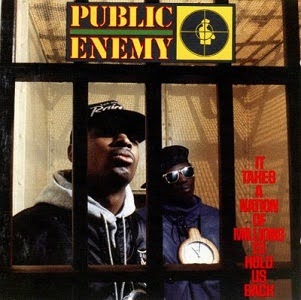Beats, bars, and civil rights activism defined the early hip-hop of Public Enemy, a group known for their powerful focus on black power and innovations in early hip-hop. Public Enemy was widely regarded for having meaningful lyrics layered on well-chosen elements of funk, jazz, and metal. The members of Public Enemy were committed to spreading ideologies from movements such as the Black Panther Party, and from affiliated thinkers such as Malcom X and Dr. King. On June 28, 1988 Public Enemy’s album, “It Takes a Nation of Millions to Hold Us Back,” was released, sending their most powerful messages yet and reaching new heights of popularity.
One can see lots of Public Enemy in today’s Black Lives Matter Movement. For starters, Public Enemy was gas to the flame in the early years of Black Rights movements. They excited their listeners with a balance of defiance and anger with energetic, soul-inspired music that gave the movement good vibes, whilst still encouraging people (and themselves) to stand up to racism. In this way, more and more people began to get involved in the movement.
“Bring The Noise,” puts Public Enemy’s defiance front and center. The track starts off with an old school gangsta rap instrumental and intricate lines of lyrics that always work with the beat. “They sayin’ we too Black, man (Bring the noise) / Yo, I don’t understand what they sayin’, but little do they know / They can get a smack for that, man.”
“Show Em’ Whatcha Got” samples the line “Public Enemy Number 1 – Show Em’ Whatcha Got” throughout, creating some paper maché sampling – an invented phrase I use here to describe that same interwoven sampling mentioned earlier. Throughout the track Public Enemy names important figures from the movement, suggesting that Black Lives Matter affiliates are all united under their God-given power: “The same God that gave strength to Rosa Parks / Gave strength to Martin Luther King, to Malcolm X.”
“Party for Your Right to Fight,” is a play on the Beastie Boys song “Fight for Your Right to Party,” making a comment about how for many white rappers, the rap game is about parties. Public Enemy on the other hand, brings focus away from parties and puts more into their music and their message. Aside from possible interpretations and the meaning of the song, it continues in a tone of defiance and anger, with lines like, “This party started right in sixty-six / With a pro-black radical mix / Then at the hour of twelve / Some force cut the power and emerged from hell.” This very defiance and anger is what makes the song a keeper for me. Powerful lines like these demonstrate the full-of-rage sound that is a crucial aspect of Public Enemy’s musical persona.
The album is also an excellent example of the variety of music Public Enemy can create. It is worth noting that at the time this album was released, it was one-of-a-kind with its unique sampling, melodies, and messages. Sampling, however, had been seen before. That being said, Public Enemy was one of the first groups to be immersed in that world of early hip-hop, and go wild with it. By incorporating funk, soul, metal, and African American political ideologies, Public Enemy made rap their own – or in their words, “cut the power and emerged from hell.”

